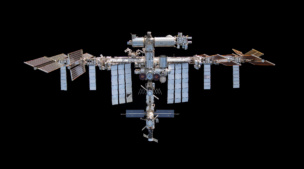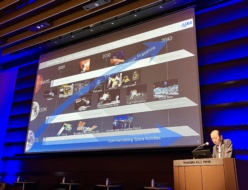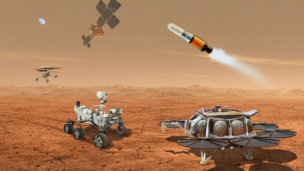AIAA will unveil a plan today that would help space organizations get access to a slew of federal economic development resources typically available to other infrastructure services such as airports, seaports, and highways.
Project Clarity, which was drafted by AIAA’s Cislunar Ecosystem Task Force, will urge the government to say unequivocally that space projects shouldn’t be disqualified from federal help just because they involve space, said Bob Brumley, senior managing partner of Marble Arch Partners and co-chair of the task force’s communications work group.
The task force is preparing to officially release a white paper with more details this afternoon at the Global Aerospace Summit hosted by the US Chamber of Commerce, who is a partner in the effort.
“The distinction between economic development as activities pursued either on Earth or in space is very likely meaningless, as both key terrestrial and space infrastructures are inextricably interdependent,” reads a copy of the white paper shared with Payload. “The success of federally-backed economic development in the 20th century—highways, air transportation, education, medicine, among others—strongly indicates that space economic development will yield benefits for Americans in the 21st century.”
Project Clarity
The idea is to treat space the same as any other sector, officials said, meaning spaceports would be eligible for the same programs or benefits as other critical or transportation infrastructure.
“As we talk to our member companies on the Space Industry Council, they need greater and more diverse access to capital besides just venture…and beyond…just NASA and DoD,” said John Neal, executive director for space policy at the US Chamber of Commerce. “We’ve been thinking about other ways to tap into government resources to provide greater access to the space industry just like any other area of infrastructure.”
The effort falls under AIAA’s broader Cislunar Ecosystem Task Force, in which several dozen participants from business, academia, and NGOs are examining how to extend Earth’s economy to cislunar space.
Key stakeholders
The organizations have already pitched their ideas to the administration on an “education tour” that included OSTP, OMB, and the National Space Council, Brumley said.
“They expected us, I think, to start talking about [how] the government is not doing enough,” he said. “We didn’t have that view. Our view is that [the] government…had all the resources it needed. What it did need was clarity.”
Next steps
The white paper urges OMB to release clarifying guidance saying that otherwise qualified funding requests shouldn’t be disqualified just because they involve space—a change that could make a big difference for the industry, but wouldn’t require a legislative fix, Brumley said.
The white paper is also asking for similar guidance from the Administrative Conference of the United States, and is urging the Congressional Research Service to study how space infrastructure projects fit into existing federal economic development programs.
But there are also some efforts on the Hill seeking to ensure space infrastructure receives the same treatment as its terrestrial counterparts. For example, lawmakers are considering introducing a bill that would make spaceports eligible for tax-exempt municipal bonds under the IRS tax code in the same way that airports are, Neal said.




